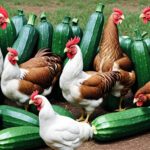Raising healthy chickens is both an art and a science, and mastering the intricacies of their growth cycle is vital to your success as a backyard farmer or commercial poultry producer. At eight weeks old, your chickens are at a pivotal stage in their development—a time when proper nutrition can set the stage for a lifetime of vitality and productivity. In this comprehensive guide, we’ll delve into the world of chicken growth, with a special focus on the dietary needs of 8-week-old chickens, ensuring they thrive and grow to their full potential.
The Importance of Nutrition for 8-Week-Old Chickens
At eight weeks, chickens are transitioning from their juvenile phase into adolescence. This stage of their life is critical as they continue to develop their bones, muscles, and feathers. Providing a balanced diet is key to overcoming the challenges of this growth phase.
Understanding the Nutritional Needs of Growing Chickens
8-week-old chickens require a diet that is rich in protein, vitamins, and minerals. Protein is particularly important as it aids in muscle development. The ideal feed for 8-week-old chickens should contain approximately 18-20% crude protein along with necessary amino acids for healthy growth.
Choosing the Right Feed for Your Flock
There are several types of feed available for 8-week-old chickens, including starter, grower, and finisher feeds. At this age, transitioning your chicks from a starter to a grower feed is advisable, which will continue to provide the necessary nutrients without the excess proteins that are more suited to younger chicks.
Factors to Consider When Selecting Chicken Feed:
- Protein Content: Ensures muscle and tissue growth.
- Calcium and Phosphorus: Vital for bone development.
- Vitamins A, B, D, and E: Supports overall health and immune system.
- Feed Form: Pellets, crumbles, or mash can affect consumption and growth.
Creating an Ideal Feeding Plan
A strategic feeding plan is integral to the well-being of your chickens. Establishing a regular feeding schedule helps maintain their metabolic rate and supports consistent growth.
Scheduling Feeds for Optimal Growth
- Early Morning: Begin with a portion of the daily feed allowance to stimulate activity.
- Midday: Offer fresh feed to ensure they have a constant supply throughout the day.
- Evening: Conclude with the remaining feed to last until the next morning.
Monitoring Feed Intake and Weight Gain
Keeping a close eye on your can chickens eat okra‘ feed intake and growth patterns allows you to adjust the feeding regimen as needed. Consistent weight gain is a good indicator of a well-balanced diet and overall health.
Evaluating Physical Health and Behavior
Beyond weight gain, observe for signs of vitality such as smooth feathering, clear eyes, and alert demeanors. These are all indications of successful growth and development in 8-week-old chickens.
The Role of Supplements and Treats
While a well-formulated grower feed provides a substantial foundation, the inclusion of supplements and treats can enhance the dietary framework of your chickens.
Nutritional Supplements: A Booster for Growth
Additives such as probiotics, enzymes, and vitamin packs can be mixed into the feed to give your chickens a competitive edge in their growth journey.
Safe and Healthy Treats for Chickens
Offering treats should be done with caution, as too many can disrupt a balanced diet. Safe options include:
- Leafy greens
- Cooked grains
- Mealworms
Always ensure that treats do not exceed 10% of your chickens’ overall diet to maintain nutritional integrity.
Addressing Environmental Factors Affecting Growth
The environment plays a crucial role in the growth and development of your flock. Not only does the nutrition matter, but also the conditions in which the 8-week-old chickens are raised.
Optimal Temperature for Thriving Chickens
Maintaining the right temperature ensures comfort and encourages feeding. The ideal range for 8-week-old chickens is 65-75°F (18-24°C).
The Impact of Housing on Chicken Development
Proper housing is essential for protection against predators and the elements. It should be well-ventilated, dry, and spacious enough to allow free movement, which is essential for muscle growth and strong bone development.
Key Elements of Effective Chicken Coops:
- Ample space per chicken
- Perches and roosts
- Secure fencing
- Adequate ventilation
- Protection from extreme weather
Troubleshooting Common Issues in Young Chickens
Despite a caretaker’s best efforts, some 8-week-old chickens may experience growth stunting or health issues. Recognizing and addressing these promptly can prevent long-term impacts on your flock’s growth.
Identifying and Dealing With Nutritional Deficiencies
Chickens showing signs of poor growth or feathering might be experiencing a lack of essential nutrients. It’s important to re-evaluate their diet and, if necessary, consult a veterinarian for specific advice or supplements.
Managing Disease and Preventing Outbreaks
Diseases can swiftly compromise the health and growth of your flock. Implementing biosecurity measures and keeping the living quarters clean are fundamental to prevention. Furthermore, vaccination programs can offer an additional layer of protection for your chickens.
Signs of Health Concerns:
- Lethargy
- Loss of appetite
- Abnormal droppings
Encouraging Strong Growth: A Recap
Raising 8-week-old chickens is a dynamic process that demands attention to detail in terms of feed, environment, and health management. By implementing these essential care tips and persistently monitoring the growth of your 8-week-old chickens, you can ensure their development is on track for a fruitful and productive life.
Remember, the food you provide, the conditions you maintain, and the care you lavish upon your flock will profoundly impact their growth and overall wellbeing. This guide is designed to equip you with the knowledge and resources to masterfully tend to your chickens, setting the stage for a vibrant and thriving flock.
May your chickens grow strong and healthy, and may your dedication to their care bring about the rewards of robust growth and ample poultry prosperity.
In conclusion, taking the time to understand and address the dietary needs and environmental factors influencing the growth of 8-week-old chickens is paramount to their success. By implementing the tips and strategies discussed, you will foster an environment where your flock can reach its full potential. Whether for backyard farming or commercial production, the rewards of raising well-nourished, thriving chickens are plentiful and deeply satisfying.






